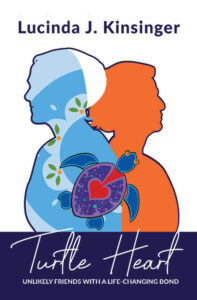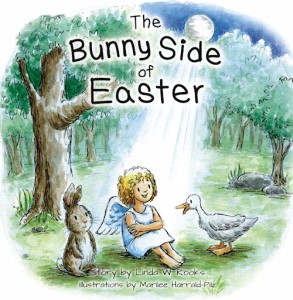 Turtle Heart – Author Interview with Lucinda J. Kinsinger
Turtle Heart – Author Interview with Lucinda J. Kinsinger
FRIENDSHIP SEEMS MORE precious at Christmastime. As we take a break from the routine of everyday to share a cup of hot chocolate, exchange a plate of Christmas cookies, or sing Christmas carols at church together, our hearts are united in a shared moment of celebration.
Author Lucinda J. Kinsinger celebrates the special bond of friendship in her new memoir, Turtle Heart: Unlikely Friends with a Life-Changing Bond by sharing her story of her friendship with a feisty, dark-eyed old woman who unexpectedly nestled into her heart and jolted her into a deeper understanding of life and of God.
As you think about your own friends, you may want to consider this as a gift for one of them Today’s interview and a short list of books that follow may give you some ideas for someone you want to bless this Christmas. A book can make a great gift for a friend or that hard-to-buy-for person on your list.
Linda: Tell us something about this friendship that was so special it inspired you to write a book about it.
Lucinda: Charlene was an elderly Ojibwe woman and fascinated me from the first time I met her. She was small and sparky and one of the most original people I have ever met. She had come from a rough background, with an alcoholic father and a lot of not-so-nice things in her past. In contrast, I grew up very sheltered, in a Mennonite home with deeply devout and loving parents. Charlene introduced me on a personal level to a part of the world I had only read about before.
We had many other differences. I was young; she was old. I was shy; she was feisty. Our friendship was often rocky…and yet in spite of that, we connected in a deep way. She was also very lonely, and that was part of the impetus for our friendship. I would visit her and help her with things, and our friendship grew.
My friendship with her taught me that we are all made of the same human stuff, no matter what background we are from. She was a great storyteller, and her stories often opened my mind to ideas I wouldn’t have understood otherwise.
Linda: Turtle Heart is an interesting title. How did you come up with that as the title of your book?
The turtle heart in my title symbolizes Char’s longing–and all of our longing–for transformation. But there’s an interesting story behind it.
Charlene had poor health and spent many, many hours in the hospital. One time, when Charlene was in the hospital I asked her what she wanted for her birthday coming up. “I want a turtle heart,” she said. Then She told me this story.
One time, her neighbor asked her to help him make turtle soup. So they cut the turtle’s head off and cut the body open, but when they came to the heart, it was still beating. Charlene kept the heart and looked at it frequently. “The heart had four chambers,” she told me, “and they stopped beating one at a time, one every week, but it was a month before they stopped completely.”
I knew why Charlene asked for a turtle heart–her own heart had been weak since childhood–but to me her request took on a broader, symbolic significance. She was standing with all of aching humanity, with our caught personalities, our trapped sins, asking for a change of heart. It symbolized Char’s longing–and all of our longing–for transformation.
Linda: Since your book is a memoir, how do you think a memoir speaks into the lives of readers?
Lucinda: A memoir is relatable to all of us because it tells of someone’s lived experience. A memoir doesn’t preach nor claim to have all the answers, but by watching the lives and choices of the characters–in this case, of Char and me–readers will experience growth and transformation in their own lives.
Linda: How would someone who is going through a difficult time in life relate to Turtle Heart?
Lucinda: Someone going through a difficult time would relate to the pain and loneliness Charlene was experiencing in her life at the time I met her. They would relate to the questions we both asked about God’s goodness in the places in life that seem unfair. They would relate to our hunger for God and our desire for righteousness in spite of it all. And they would be challenged and inspired by the simple faith Charlene came to, in the same way that I was.
Linda: What makes Turtle Heart a good gift for a friend at Christmas?
Lucinda: Turtle Heart is an interesting read that captures your attention and compels you to keep reading. It is a book that dives below the surface of things into the underlying thoughts and emotions we all feel but don’t often say. And it is a book that points to Jesus as the one who ultimately brings hope. Life is a mystery, but He is with us, He is real, and He can give us courage to face even the most difficult circumstances and relationships.
Linda: What do you want readers to take away from your book?
Lucinda: First of all, I want readers to have a clear picture in their mind of the fresh and vital person that was Charlene.
I want them to gain sense of the bigness of God and the simplicity of faith, things I learned from Charlene. You see, in the beginning, I wanted to help her know God—and through our friendship and through reading the Bible I gave her, she did come to know God in a deeper way. But she also helped me to grow in my understanding of God. She had a simple, pure love for him and a worship for him that sprang naturally from her love and appreciation of nature. She helped me to see how BIG God is, and how he reaches around to all people, not just people in churches.
Most of all, I want readers to come away with questions—the good kind of questions that lead one to see life in a different way. I designed Turtle Heart, not to give a lot of answers, but to lead readers to think.
Linda: As you know, the tagline for this blog is “Finding Hope in Unexpected Places.” How does Turtle Heart touch on the theme of hope?
Lucinda: Well, first of all, Charlene was totally unexpected in my life. That’s actually a line from the book: “She was not the old lady I had expected.” Our friendship was unlike any I expected to have. But our friendship brought two people hope. She found hope in a friend that brought love to her loneliness and in the pages of the Bible I convinced her to read. I found hope in seeing how God touches the lives and hearts of people from many different backgrounds and in seeing how her growing faith in Jesus gave Charlene the courage to meet the hard places in her life. When I first met her, she was scared to die, but at the last, she wasn’t scared anymore.
I hope Turtle Heart will bring many other people a deeper faith and hope.
Linda: Where can we buy your books?
Lucinda: Turtle Heart, as well as my other books, are available online at Amazon and Barnes & Noble. You can also contact me directly at lucindajkinsinger@gmail.com for an autographed copy shipped to your address.
If you’ve still got people on your Christmas list you need presents for, here’s a list of other books I’ve featured this year that might make good Christmas presents for someone on your list.
For some inspiration, one of the following two books might be just the gift for one of your friends:
 Day-votions® with Your Faithful Father: 90 Days with the One Who Wants to Meet All Your Needs, Author Rebecca Barlow Jordan shows the reader how to talk with God intimately and honestly about their deepest needs. As a bestselling, award winning author of 13 books, and with the pen of a poet and the heart of a disciple, Rebecca’s passion is helping readers find intimacy with God. In this new book, she wants to show the reader what it means to be His child.
Day-votions® with Your Faithful Father: 90 Days with the One Who Wants to Meet All Your Needs, Author Rebecca Barlow Jordan shows the reader how to talk with God intimately and honestly about their deepest needs. As a bestselling, award winning author of 13 books, and with the pen of a poet and the heart of a disciple, Rebecca’s passion is helping readers find intimacy with God. In this new book, she wants to show the reader what it means to be His child.
Reflections on the Names of God by Ava Pennington is a devotional that explores each of 60 names and attributes of God from 3 individual perspectives: who God is, how this name or attribute changes us, and how it changes our relationships. Every name God calls himself and every name his people called him holds clues to who he is, how he relates to his children, and the promises he has made–and kept.
3 individual perspectives: who God is, how this name or attribute changes us, and how it changes our relationships. Every name God calls himself and every name his people called him holds clues to who he is, how he relates to his children, and the promises he has made–and kept.
 For someone on your list who is health conscious right now, you might want to consider Unleash Your God-Given Healing: Eight Steps to Prevent and Survive Cancer by Ginny Dent Brant.
For someone on your list who is health conscious right now, you might want to consider Unleash Your God-Given Healing: Eight Steps to Prevent and Survive Cancer by Ginny Dent Brant.
Author Ginny Dent Brant’s diagnosis sent her on a quest to discover what caused her to contract cancer, what she could do to survive it, and how she could help others prevent it. She discovered we can help our doctors by changing what they have no control over—our lifestyle and health habits. By doing so we build our immune systems and reduce toxic loads.
For some fun and romance, you might want to try a romance novel by author Karin Beery.
In Avoiding Marriage, Jessica Miller has made a mess of her already confusing life. Now, she’s back in Boyne Heights, and she’s determined to fix her reputation, even if that means working for her ex-boyfriend and avoiding her grandmother’s attempts to find her a new one. https://www.amazon.com/Karin-Beery/e/B07HQ2GZQS
 To add a little excitement for those long, cold winter nights, one of your friends might enjoy my new suspense thriller, Pieces of Dark, Pieces of Light.
To add a little excitement for those long, cold winter nights, one of your friends might enjoy my new suspense thriller, Pieces of Dark, Pieces of Light.
With time travel, suspense, relatable characters, positive themes of hope, and even a hint of romance, Pieces of Dark, Pieces of Light is a thriller appropriate for teens or adults alike, taking the reader on an exciting journey through a myriad of dangers and landmines across two continents.
Looking for a book for a child on your list?
My children’s book, The Bunny Side of Easter, is an exciting adventure about four little animals lost in the forest, who face some scary moments and overcome them because of a little rabbit’s heroism. And, yes . . . this is a story about the Easter bunny, but it’s also about how the rabbit got in the moon by being a hero. We all know Easter heroes are heroes all year long so share this bunny story with your child this Christmas. This little bunny will warm your child’s heart and yours — no matter what the time of year.






